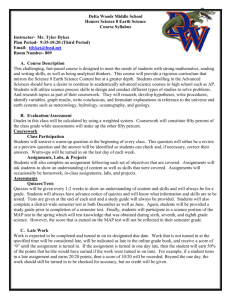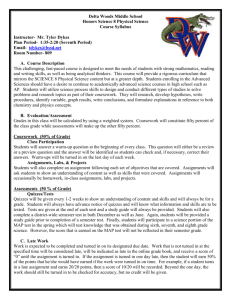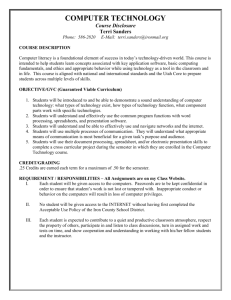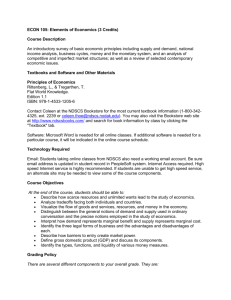BOTE 171: Medical Terminology (4 Credits) Course Description
advertisement
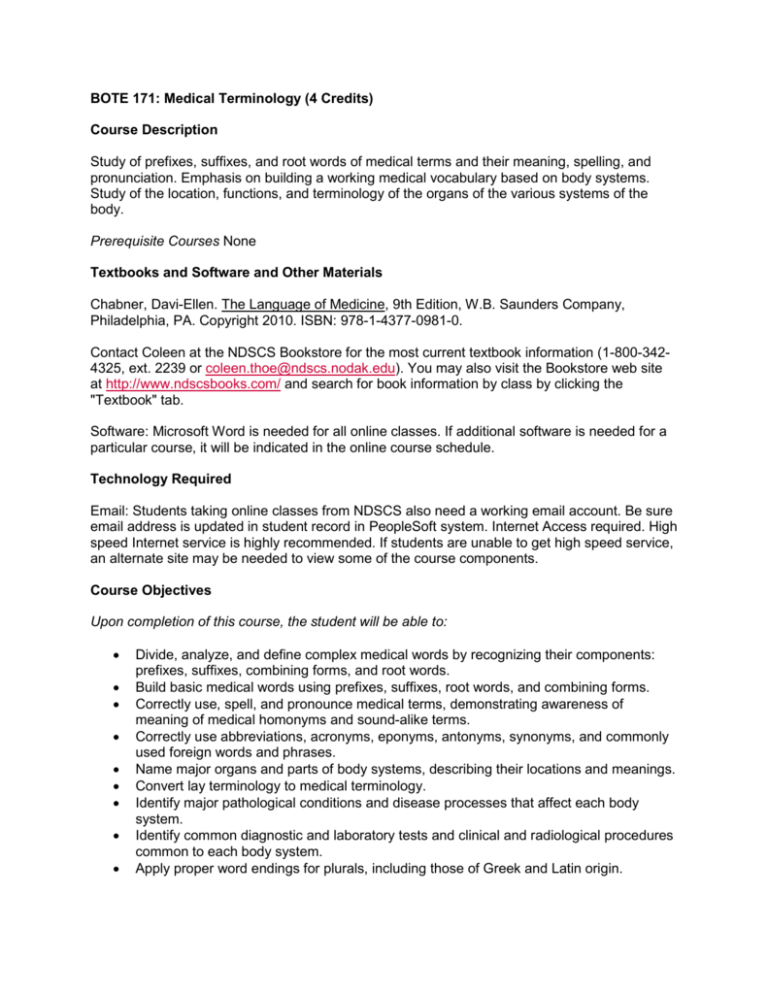
BOTE 171: Medical Terminology (4 Credits) Course Description Study of prefixes, suffixes, and root words of medical terms and their meaning, spelling, and pronunciation. Emphasis on building a working medical vocabulary based on body systems. Study of the location, functions, and terminology of the organs of the various systems of the body. Prerequisite Courses None Textbooks and Software and Other Materials Chabner, Davi-Ellen. The Language of Medicine, 9th Edition, W.B. Saunders Company, Philadelphia, PA. Copyright 2010. ISBN: 978-1-4377-0981-0. Contact Coleen at the NDSCS Bookstore for the most current textbook information (1-800-3424325, ext. 2239 or coleen.thoe@ndscs.nodak.edu). You may also visit the Bookstore web site at http://www.ndscsbooks.com/ and search for book information by class by clicking the "Textbook" tab. Software: Microsoft Word is needed for all online classes. If additional software is needed for a particular course, it will be indicated in the online course schedule. Technology Required Email: Students taking online classes from NDSCS also need a working email account. Be sure email address is updated in student record in PeopleSoft system. Internet Access required. High speed Internet service is highly recommended. If students are unable to get high speed service, an alternate site may be needed to view some of the course components. Course Objectives Upon completion of this course, the student will be able to: Divide, analyze, and define complex medical words by recognizing their components: prefixes, suffixes, combining forms, and root words. Build basic medical words using prefixes, suffixes, root words, and combining forms. Correctly use, spell, and pronounce medical terms, demonstrating awareness of meaning of medical homonyms and sound-alike terms. Correctly use abbreviations, acronyms, eponyms, antonyms, synonyms, and commonly used foreign words and phrases. Name major organs and parts of body systems, describing their locations and meanings. Convert lay terminology to medical terminology. Identify major pathological conditions and disease processes that affect each body system. Identify common diagnostic and laboratory tests and clinical and radiological procedures common to each body system. Apply proper word endings for plurals, including those of Greek and Latin origin. Locate and identify terms describing anatomical positions, directions, and planes of the body; identify body cavities and recognize organs contained therein; locate and identify the anatomical and clinical divisions of the abdomen. Identify and use appropriate medical references and other resources to research and study common diseases and conditions, and to stay current with trends and developments in medicine. Complete all assignments, quizzes, and final exam. Achieve a passing grade acceptable to your respective program. Program Assessment Outcomes: Students will be given a medical terminology pre-test at the beginning of the semester, and the same test as a post-test at the end of the semester. These tests will not be utilized in student grading for the course, but will be used for assessment purposes and for evaluation of course effectiveness, learning outcomes, and instructor accountability. Grading Overall assessment for this course is based on unit quizzes, worksheets/assignments, participation in the online discussions and a final exam. Grading Criteria All assignments will be completed as assigned by specified completion deadlines. If assignments are not completed when due, no grade/points will be assigned. If the instructor agrees to grant credit for late work, 10% may be deducted at instructor's discretion. A = 94-100% B = 87-93% C = 80-86% D = 73-79% F = below 73% Assignments: Assignments will be given on the textbook, in addition to research of medicalrelated topics and some limited chat/discussion forum postings. All assignments should be submitted to the appropriate drop box, as indicated on the unit assignment page. Discussion Forum: I will be assigning a limited number of discussion topics for you to post responses to. Please treat these as any other assignment--use good grammar, punctuation, and sentence structure, and PROOFREAD before posting. These postings will be graded for spelling and grammar errors, and it is a good practice to always proofread before posting. Discussion forum postings will be evaluated using the following quality checklist: -Medical or English word misspelling @1.5 points/error -Medical word misuse @ 3 points/error -Grammar error, subject-verb agreement @0.5 points/error -Grammar error, plurals @0.5 points/error -Grammar error, possessives @0.5 points/error Work Expectations Students should estimate approximately three hours of course work per credit per week for NDSCS classes. For example, a three-credit class may require approximately nine hours of work time a week for the student. This amount may vary by class and by student. Policies and Procedures NDSCS online students should be aware of various policies and procedures such as those shown below. Attendance - Regular attendance and completion of all assignments, on time and as scheduled, is important to your success in this course. As your instructor, if I am unexpectedly unavailable or delayed in reviewing or correcting assignments, I will notify the class of this as a sign of courtesy and respect. Students are expected to log into their online classes frequently during each week of the semester and to submit course work on time to meet due dates set by the instructors. Attendance and class participation is monitored and students not submitting work in their online classes may be dropped from the class. Review the Attendance Policy for further details. Computer Access - It is the student's responsibility to maintain access to a working computer and Internet connection to keep up in online class assignments. Because computer problems do occur, students should have a plan for alternative computer access in case of computer problems. Students will be able to access their online classes from any computer with an Internet connection. Computer crashes and disasters are bound to happen, whether you are an online or on-campus student. However, ISP problems or computer issues are not an excuse for turning in assignments later than the specified due date. It is your responsibility to notify your instructor of such issues, proactively seek a solution to your problem, and access another computer for assignment completion in the event of hardware or software problems. Refund Policy/Withdrawal Refund Schedule Academic Calendar - Online classes follow the same calendar as regular on-campus classes. They begin with the semester begins and students do not need to log in at specific days/times but instructors do set due dates for assignments and exams to be submitted so there is structure to the classes. Online classes are not self-paced but do provide flexibility in that they are accessible 24/7 to allow students to work around other commitments when doing their course work. Academic Integrity - Integrity is an NDSCS core value and there is an expectation that all students, as members of the college community, adhere to the highest levels of academic integrity. Dishonesty in class, laboratory, shop work or tests is regarded as a serious offense and is subject to disciplinary action by the instructor and dean of the respective division. For more information, refer to the NDSCS Student Planner or College Catalog under College Policies and Basic Regulations of Conduct. Types of Misconduct Cheating: Intentionally using or attempting to use unauthorized materials, information, or study aids in any academic exercise. Fabrication: Intentionally and unauthorized falsification or invention of any information or citation in an academic exercise. Facilitating academic dishonesty: Intentionally or knowingly helping or attempting to help another to commit an act of academic dishonesty. Plagiarism: Intentionally or knowingly representing the words or ideas of another as one’s own in any academic exercise. Disabilities and Special Needs If you have a disability for which you are or may be requesting an accommodation, you are encouraged to contact both your instructor and the Disability Support Services Office, 225 Mildred Johnson Library (phone 701-671-2623, 800-342-4325, ext. 32623) as early as possible in the term. Other College Policies can be found in the Catalog. Student-Instructor Communications While an online class is available 24 hours a day and offers greater flexibility for the student and instructor, keep in mind that your instructor will not be available 24 hours a day. I will check my email, voicemail, and Cyber Office messages on a regular basis, but there may be times when I am unavailable due to other commitments and job responsibilities. I will respond to email, voicemail, or Cyber Office messages as time allows. As a general rule, you can expect your direct question to be answered within 24 hours during week days. When sending an email, please include your full name so I know to whom I'm responding. Often, the email address does not indicate who is sending the message. Exams Quizzes are an integral part of this class. Quizzes assess your understanding of the presented material and determine whether you have met the course objectives. There will be a graded quiz in each unit, available for 1-hour, one-time access in the presence of your Exam Proctor. Schedule Online classes follow the same academic calendar for start and end dates as regular oncampus classes. While there is no set time for students to be logged into a class each day, instructors do set due dates for assignments and exams. Students should lot into classes frequently to keep up with announcements and to keep up with course work. Online classes are not self-paced. You may want to print the for NDSCS Academic Calendar reference during the year. It includes semester start and end dates, final days to add/drop classes for each semester, vacation dates, etc. Tuition/Fees See tuition and fee information, Refund Policy and Withdrawal Schedule information in the NDSCS Online site under Financial Information. Tuition and fee costs do not include books, software, supplies and other program or course fees which may vary by program. Instructor Information Geralyn Matejcek Email: Geralyn.Matejcek@ndscs.edu


